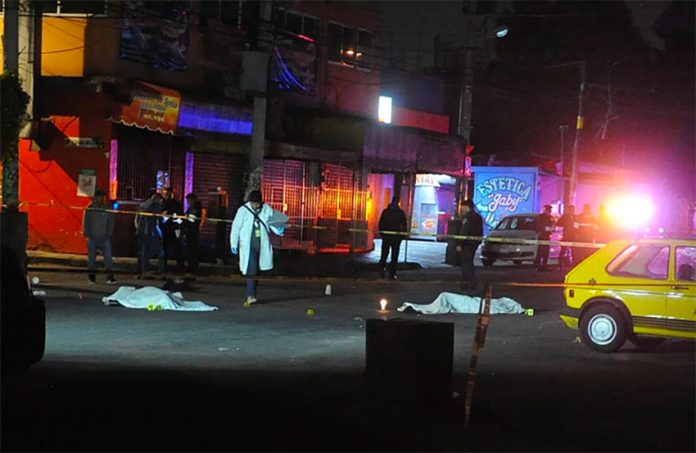Homicides increased 7% in November compared to the same month last year, bringing the total number of murder victims in 2019 to almost 32,000.
There were 2,921 victims of intentional homicide last month, according to data from the National Public Security System (SNSP), making November the fourth most violent month of the year after June, July and August.
With 346 homicides, Guanajuato was the most violent state in the country in November followed by México state, Baja California, Chihuahua and Jalisco, all of which recorded more than 220 murders.
The same five states were the most violent in the first 11 months of the year in terms of sheer numbers, although Colima recorded the highest per capita murder rate.
In Guanajuato, where the Jalisco New Generation Cartel and the Santa Rosa de Lima Cartel are engaged in a turf war, 3,211 people were murdered between January and November.
With 2,657 homicides, Baja California was the second most violent state in the period followed by México state, Jalisco and Chihuahua, where 2,603, 2,465 and 2,379 people were murdered respectively.
The number of people murdered in the five states represents 42% of all homicide victims across the country in the first 11 months of 2019.
SNSP data shows that there were 31,688 homicide victims to the end of November, a 2.7% increase compared to the first 11 months of 2018, which was the most violent year in recent history.
There were 916 femicides in the same period, a 13% increase, while kidnappings rose 3.8% to 1,231 cases.
High levels of violent crime have continued to plague Mexico this year despite the nationwide deployment of the newly-created National Guard in July and the continued use of the military to carry out public security tasks.
President López Obrador continues to blame previous governments for the rampant violence, and is especially critical of the administration of former president Felipe Calderón, who launched the so-called war on drugs in late 2006. More than 200,000 people have been murdered in the years since.
López Obrador has pledged that the government’s social programs, intended to address the root causes of violence, will help to pacify the country but crime statistics for this year indicate that any impact they have on reducing criminality is unlikely to come quickly.
The government’s security strategy, which avoids the use of force whenever possible, came under increased pressure in the latter months of the year after a string of cartel attacks including an unprecedented show of strength by the Sinaloa Cartel in Culiacán in response to an operation to capture one of Joaquín “El Chapo” Guzmán’s sons and the massacre of nine members of a Mexican-American Mormon family in Sonora.
However, López Obrador has remained adamant that responding to violence with more violence is not the right strategy and in November declined an offer from United States President Donald Trump to help combat Mexico’s notorious drug cartels.
The president said this week that he was certain his government will be able to guarantee security in Mexico, stressing once again that the root causes of violence are being attended to, impunity is no longer accepted and that the deployment of greater numbers of police and National Guard members is in the works.
Source: Infobae (sp)
